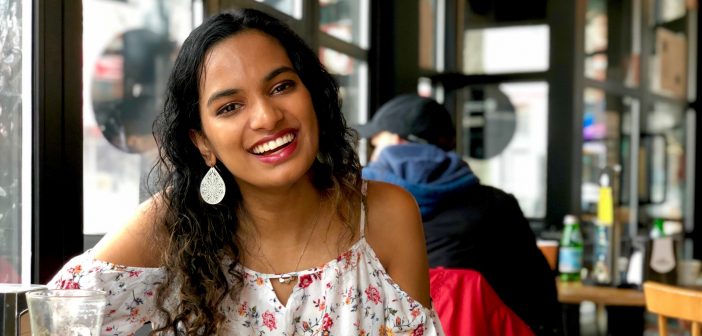In her early years at Fordham, she struggled with an abusive relationship, a falling out with friends, and a breakup with a different boy she loved. She started school as a chemistry major on the pre-med track—but she wasn’t happy.
In the fall semester of her junior year, Govindan decided to take her life. On a cold day in October 2017, she sat at a Starbucks a few blocks away from Fordham’s Lincoln Center campus, drafting suicide letters to her family. Then she got a life-changing phone call from her mother.
Govindan’s parents—a pediatric anesthesiologist and a bank vice president who pulled themselves out of poverty in India—had refused to let her pursue stand-up comedy, something she had loved since middle school. But after hearing the pain in her daughter’s voice, her mother changed her mind.
“She [had]told me, ‘Indian girls don’t become comedians. They become doctors and scientists and biologists and engineers,’” Govindan, a Fordham College at Rose Hill senior, said at a Fordham event last fall. “But this time around, she said yes. And to me, that just meant so much because what she was telling me is, I don’t care what we think. I don’t care what other Indian families think. What matters to me right now the most is your happiness.”
Now, Govindan is a young comedian who has performed around the world, from Ireland to Houston, Texas. At the age of 21, she was invited to apply as a writer for a TV show. And after receiving therapy, she’s determined to destigmatize mental illnesses through candid discussions on social media.
“Happy #WorldSuicidePreventionDay,” she wrote on social media. “What ultimately ended up helping me was seeking out therapy and medication and investing in a hobby I found happiness in (comedy!!!).”
Last year, Govindan applied for a fall production internship at the Emmy Award-winning show Full Frontal with Samantha Bee—and got it. She transcribed news and TV clips, answered phone calls, and went out on coffee runs. In conversations with senior colleagues, Govindan said, she received “uncensored advice” that will help her develop as a stand-up comedian. And, thanks to one of those mentors, she was able to meet one of her biggest idols—Hasan Minhaj, an Indian-American comedian who co-created and hosts the Netflix series Patriot Act.
“Every day as I continue to pursue stand-up comedy,” Govindan said, “I thank the heaven and the stars that on that cold, crisp day in October of 2017, I chose my own happiness instead of choosing to end my life.”
Finding Humor in the Darkness
Govindan’s jokes begin with observations. If she makes a friend laugh, she said, she’ll record what she said in her phone. Those notes might make it to the official notebook that she brings and refers to on stage—the book that holds all her organized sets.
One of those stand-up sets is about her experience with being suicidal. When Govindan performs the set, she speaks about a much more private notebook—the place where she wrote why she should stay alive. One reason: never being able to taste another Cheez-it cracker again. Another: never knowing what would happen in the season finale of her favorite TV show Brooklyn Nine-Nine.
“Probably my favorite reason—and perhaps the most ridiculous reason—was Kylie Jenner,” she recalled. “I was like, I can’t die without knowing whether or not Kylie Jenner is pregnant.”
More seriously, comedy gave her a reason to live.
“Every time I was emotionally distressed, every time I went to this dark place, I would open up my notebook and force myself to write a comedy set,” she said. “I think that’s really what carried me through the darkness of it all … Being able to find the humor in everything.”
College Comedy and Beyond
Govindan’s first stand-up comedy show was a five-minute slot on December 2017 at Carolines on Broadway—a place where legendary performers like Jerry Seinfeld got their start. Since then, she has performed nearly 40 times in New York City; her home state of Texas; and Ireland, where she studied abroad for a semester. She says her shows usually run from five to 10 minutes, and her audience size is around 40 people.
In each show, she segues into bits and pieces of her own life: her identity as an Indian-American, dating, her struggles with mental illness, her experiences with therapy.
“I’m there to make you laugh—not talk about my own life,” she said. “But I also put enough of myself and my own truths in there that I feel good at the end of the day about what I’ve done … that I feel like I’ve been authentic with myself.”
Govindan reflected on two of her past shows this January. In the first one, she bombed. No one laughed except for her two high school friends, she said. Later that night, she performed the same seven-minute set somewhere else. But this time was different. She recalled two young Indian girls who came up to her and said, “We’ve never seen an Indian woman perform stand-up comedy live. Seeing you there, seeing you talk about the Indian-American experience, and seeing everyone else laugh just felt … amazing.”
In a few months, Govindan will graduate from Fordham with a degree in psychology; industry knowledge from classes in sitcom writing, documentary television, and screenwriting; and several internships under her belt. She says she’ll pursue a full-time job in either comedy writing or entertainment marketing. And she dreams of someday hosting her own late-night talk show. She’s even picked out a name for it—The Low Down. But in the end, she says, what matters most is the impact she has on the people around her.
“I hope I can be that salvation for someone else,” Govindan said. “If I can be that reason—if I can be the light at the end of the tunnel for anyone else, in the same way that stand-up comedy was for me—then I will be doing my job.”
Guidance for Students Experiencing Anxiety or Depression
Govindan isn’t alone in her struggles with depression and mental health. More than 63 percent of college students reported experiencing overwhelming anxiety within the last year, according to the American College Health Association’s 2018 National College Health Assessment. And almost 42 percent of surveyed students said they felt so depressed that it was difficult to function.
“Anxiety and depression are the most common presenting problems in our office as well,” said Jeffrey Ng, Psy.D., director of counseling and psychological services (CPS) at Fordham. “Student utilization of on-campus mental health services has been trending upwards for the past 10 years nationally, including at Fordham.”
But there are many different ways to combat anxiety and depression, both on one’s own and with help from loved ones and professionals. Ng offered some suggestions for students struggling with their mental and emotional health and those who care about them:
Practice self-compassion. “Students often have perfectionistic and unrealistic demands and standards for themselves—standards that they likely wouldn’t apply to others,” Ng said. “We encourage our students to try to be as kind to themselves as they would to someone you love or care about.”
Exercise. “Engage in physical activity or exercise,” Ng said. “Physical activity and exercise are incredibly effective for reducing mild to moderate anxiety and depression.”
Practice digital and social media literacy. “Social media constantly exposes and bombards us with airbrushed or curated versions of people’s lives. When we compare ourselves to what we see on social media, we may get the sense that ‘we’re not good enough or doing enough.’ This can contribute to lower self-esteem, which can increase our vulnerability to mental health problems,” he said. “We encourage our students to try to be more intentional, thoughtful, and discerning about how they perceive and relate to social media.”
Don’t forget the essentials. “Attend to basic needs like sleeping, eating, and playing,” Ng said. “Having social relationships and social interactions—those are basic needs as well.”
Remember that there are multiple routes to healing. “It’s important for students to remember that there are many, many different pathways or routes for healing and feeling better. Acceptance from our parents (as in Govindan’s case) is just one of those paths,” Ng said. “Unconditional acceptance is obviously very important for our mental and emotional health, but for some students, they may unfortunately never experience that level of acceptance from their parents. So it’s especially important for them to recognize that there are multiple pathways and possibilities for healing.”
Normalize vulnerability. “One of the most important things we can do to support our students is to normalize vulnerability, imperfection, and struggle as part of the human experience,” Ng said.
Seeking help. One local resource is Fordham’s Counseling and Psychological Services Center, with offices on the Rose Hill, Lincoln Center, and Westchester campuses. To make an appointment, students can call or simply stop by. During non-business hours, students can reach out to public safety or residential life staff for emergencies.
Off-campus, 24/7 resources include the National Suicide Prevention Lifeline, 1-800-273-TALK (8255) and, for those who would rather type than talk, the Crisis Text Line.
“It’s important for our students to recognize that help-seeking is a sign of strength and maturity rather than weakness,” said Ng.



